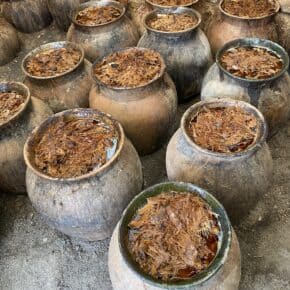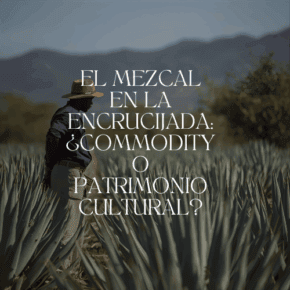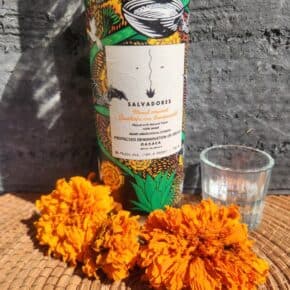
This is the liquid waste that remains after distillation. Literally the word means “cheap wine” which is both a call back to all the wine and mezcal associations like Viño del Mezcal and probably a terrifyingly accurate description of what viñaza is in the mezcal world – so cheap and alcoholic that it might do the job but it would probably kill or seriously injure you in the process.
Mezcal production actually creates two types of waste, the fibrous solid waste called bagazo and the liquid waste of viñaza. Both are highly toxic and have the same pollution issues, especially when they’re produced at volume. Viñaza is highly acidic and, in volume, a major pollutant. Traditionally mezcal production was such a small scale process that it didn’t produce much viñaza. But it has definitely become one of the major issues in the mezcal world with the boom in production since the early 2000’s.
Anecdotally we’ve heard of massive fish and aquatic plant life kill offs in the Rio Hormiga Colorada which runs through the major mezcal producing towns like San Juan del Rio. When it’s dumped into water it bonds to the oxygen depriving fish and acquatic plant life of what they need to survive. Plus, anyone trying to use that river water for human consumption will have a problem. Oh, and what about those people trying to use it for irrigation or, better yet, to make mezcal: They lose as well.
We’ve also seen it poured freely onto fields in significant volume which adds to pollution there. Again, at low volumes this may not have been an issue but now it’s serious. Even worse, the viñaza is so corrosive that you need specialized containment vessels, ideally made out of plastic. Otherwise it can quickly cut through cement, clay, and other traditional materials.
One positive note is that tequila has already encountered viñaza pollution. Some of the solutions in that industry may be applicable to large mezcal producers because they involve using chemical additives to neutralize the most toxic and acidic compounds in viñaza. But chemicals can be expensive and difficult to get ahold of so this may not be a solution applicable to small producers which account for lots of mezcal production. Another ray of hope is that some mezcal producers have been taking the issue seriously and working through potential solutions. As Susan discussed in her article about Sombra’s drive to sustainability, all sorts of innovative yet very basic field ready solutions are being tested. And they’re not alone, major brands like Del Maguey have been working on this issue for quite some time.
Read more of our entries in the Mezcalistas Encyclopedia of Mezcal and email us questions or ideas for future entries.












Leave a Comment